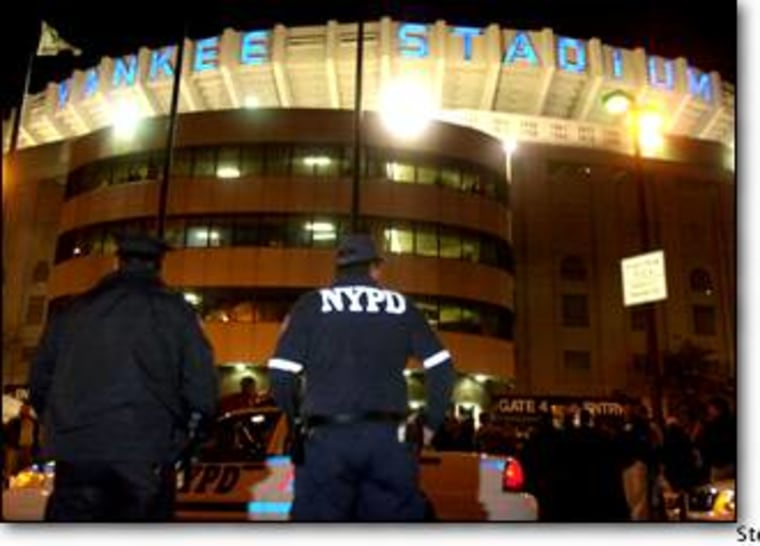On a recent summer afternoon, Yankee Stadium roared with excitement ahead of a rare daytime, workday game with the Kansas City Royals. The specter of terrorism, so palpable during last year’s World Series here, seems completely absent. Not even the signs warning of strict new security measures could dampen the mood.
In the wake of the Sept. 11 attacks, Yankee Stadium, like public places all around the United States, instituted new measures meant to prevent acts of terrorism at America’s most symbolic sites. The Yankees’ Web site warns that “no backpacks, briefcases, attaché cases, coolers, glass or plastic bottles, cans, large purses, or bags will be permitted into the ballpark.” All of those changes date from Sept. 11.
James Mathews, a fan waiting in line to go in, says the security immediately after the attacks was almost absurd.
“Earlier this year, they were banning umbrellas,” he said incredulously, “and I thought that was silly.”
Mostly though, fans say that either they don’t notice or don’t mind the increases in security. The security made an impact on Chris McGuiness, but he took a philosophical attitude.
“You have to cut a little slack,” he says. His advice for dealing with the small irritations: “Leave a little more time to get here and a little more time to get in and it’s cool.”
Public security across the country
The tragedies of Sept. 11 did not affect merely the World Trade Center and the Pentagon, nor were they confined to the New York-Washington corridor. In some ways, the whole nation stopped that day and reevaluated its security.
In Boston, for instance, the observation deck atop the John Hancock Building is permanently closed. John Heavey, who runs security at the 62-story skyscraper, says that each year more than 400,000 people visited the observatory on top of the building — the tallest in New England.
“Once they are inside, it is very difficult to control or limit their access to other parts of the building,” he said. “Since there is no feasible way to fix this problem, the prudent thing to do is to close the observatory.”
Near San Francisco, officials temporarily put the Golden Gate Bridge on a “super-heightened” state of alert. The reason cited by California officials: On July 16, while arresting three al-Qaida suspects in Madrid, Spain, police recovered a videotape that showed detailed footage of the Golden Gate Bridge as well as other famous landmarks, including World Trade Center, the Statue of Liberty, the 110-story Sears Tower in Chicago and the Disneyland and the Universal Studios theme parks in California.
Changes: seen and unseen
Many changes in security go unnoticed by the public. Officials in the nation’s capital took an extraordinary step when they closed Reagan National Airport until Oct. 4, citing its proximity to the seat of government. Even now, the airport is operating at 24 percent capacity. Around Washington’s underground rail system, workers installed blast-resistant trash bins in place of conventional cans. Washington and other cities increased undercover police officers and refined their emergency response plans.
In other cases, changes in security take people by surprise.
John Paul, a tourist visiting New York from Florida, purchased tickets for the ferry that serves the Statue of Liberty and the immigration museum at Ellis Island, only to find out later that the statue has remained closed ever since the attacks.
“Oh, I don’t care,” he said as he boarded the ferry in Lower Manhattan, adding that “I feel safe.”
At workplaces around the country, security changed in a very conspicuous way.
Andrea Nunez, who works for a corporation in Manhattan, says she now has to carry around “about five different IDs just to enter the building.” It may not prevent another attack, but “at least they’ll know who’s going into the building and have a way of following up.”
Life goes on
Many argue that showing fear is conceding victory to the terrorists. Defiance, in some respects, has become a defense mechanism. Others, however, seem completely sincere in their determination not be be affected. Raul Gregory Reardon, a Manhattan resident, says: “I have no anxiety problems since September 11 at all. Amazingly enough, I’ve had no neurotic reaction.”
More typical though, are reactions like those of Shawn Collymore (“I wasn’t born to be nervous”) and Jimmy Ralph (“I can’t let any of them ruin my life).”
But Dave Monteagudo, a visitor from Illinois, has no qualms about random searches or metal detectors. “You don’t really have to wait,” he says, “but there are still the precautionary measures.”
Brian Menke, a visitor from Tampa, Fla., agrees. As he waited in line at Yankee Stadium, famous not only for great baseball but for the fierceness of its fans, Menke said: “I’ve been here four or five times, and I noticed that people are nicer.”
